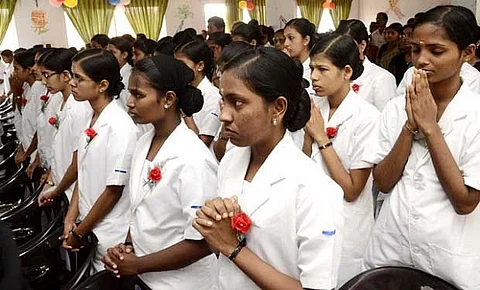

Hospitals in Karnataka are facing a severe crunch in the nursing profession. According to statistics with the Karnataka health and family welfare department, the state has recorded 2118 vacancies of nurses and 1504 vacancies of paramedical staff in government hospitals. Private hospitals too have been facing a similar staff crunch with senior nurses putting in their papers on a regular basis, with many heading abroad for better pay and job opportunities,The Times of India reported.
"While better pay is a driving force for nurses leaving the country, there are other factors, including dissatisfaction with the work environment, lack of recognition and respect they deserve in the healthcare system and negative social attitude towards the profession," Dr Upendra Bojhani, assistant director at the Institute of Public Health (IPH), Bengaluru, told TOI.
Most prefer to move to the United States and West Asia not just for better financial stability, but also for the exposure they get at work.
Between 2009 and 2015, the highest number of nurses- i.e. 6,138 nurses- recruited from non-EU countries into National Health Service (NHS) in Britain were from India.
While there is a significant demand of nursing professionals in the country, Anita A Deodhar, President, The Trained Nurses' Association of India (TNAI), wrote in a piece for the Financial Express that, "However, in reality, nursing and midwifery profession is not honoured as an autonomous body in spite of the fact that they are fully developed, qualitatively and quantitatively. The services rendered by them to ailing patients do not receive proper recognition from other health professionals in the medical field and even by the society at large. They are not accepted as leaders or administrators in their own fields without assigning any justifiable reason for such lack of recognition for the nursing profession."
Karnataka, which has the highest number of nursing colleges in the country, will see 42 such institutes shutting their doors this year due to lack of students.
Students, working nurses and experts blame the drop in admission in nursing colleges for such courses to several factors including lack of quality education, poor infrastructure and payment.
Describing her struggles, a nurse who started working at a Bengaluru hospital last year told TOI, "When I applied for a job at city hospitals, I was turned down by most as I did not pass out from a quality institute, though I had paid about Rs 3 lakh for the degree. I got a job after going door to door, and I am paid peanuts. I have dissuaded my sister from joining my profession, though I'm proud of my service towards ailing people."
A 2008 Live Mint report stated that the state was then struggling to deal with an "unusual position of an oversupply of the institutions even as the nation faces an acute shortage of healthcare professionals".
Earlier this year, over 400 nursing staff of Employees’ State Insurance Corporation (ESIC) Karnataka went on a casual mass leave as a mark of protest as they demanded a hike in pay.
Sharafudheen P, President of ESIC Nursing Officer's Association, had then said, "We boycotted our duties for a day as the government has failed to answer our needs for the last two months. We put a lot of hard work to take care 50 to 60 patients per working shift, unlike any other paramedical staffs like physiotherapists and radiologists do. Despite our commitment, we did not get a pay hike under the 7th pay commission while the other paramedical professionals have obtained it."
The severe shortage of nurses is not a new trend with the state witnessing a scarcity of trained professionals from quite some years now.
According to a 2014 report in The New Indian Express, nearly 77 per cent of the posts of nurses were vacant across the four major government hospitals in Bengaluru, with the worst hit departments being emergency and intensive care units (ICU).
Some experts state that in order to retain nurses, they need to be promoted to upgraded designations.
"A career path or progression can be mapped for them since once they become nurses they remain so all through their lives. Nurses can be promoted as nurse practitioners, a popular concept in the US. They are like an assistant to the physician and a lot of pharmacies encourage such practitioners. A generally registered nurse who has acquired the knowledge, complex decision-making skills and clinical competencies for expanded practice is the one who can acquire this level," Dr Sudarshan H Ballal, chairman, Manipal Hospitals, explained to TOI.